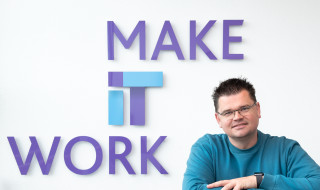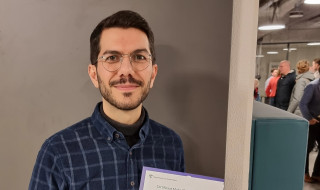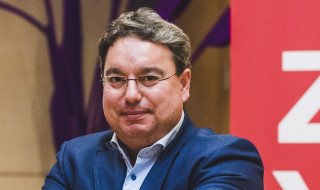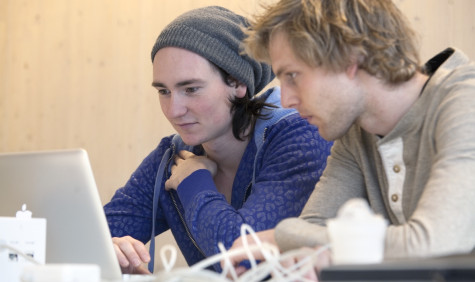Investing in what is truly valuable with microcredentials
To respond faster to technological developments and the great need for specialised IT staff, the Hogeschool van Amsterdam is setting an example. Make IT Work is a retraining programme in which students obtain microcredentials. "In this way, you make talent permanently employable."
"A microcredential says something about a small study component and provides recognition," explains Ronald Kleijn. At the Hogeschool van Amsterdam, Ronald is programme leader of Make IT Work, a unique college-level retraining programme for a career in ICT. "It focuses on the individual and the learning question they have to get somewhere," he says.

"Making educational offerings loosely coupled." Ronald Kleijn, programme leader Make IT Work (photo: Monique Kooijmans)
Students take courses at the Hogeschool van Amsterdam for five months. Before they even start the programme, students make a match with an employer. This way, they know where they will work after their retraining or further training. They receive an offer with job guarantee for six months, with the intention of permanent employment.
Study components that produce microcredentials are related to each other, but do not necessarily form a fixed whole. "An advantage is that you can make educational offerings loosely coupled and therefore pay attention to what is important for a student at that moment in the study career or future career," says Ronald.
Having a skill and being recognised for it
Make IT Work student Soheil now has thirteen microcredentials and a job with an international IT organisation. The microcredentials were awarded to him by the educational institution through SURF's edubadges platform. "Microcredentials are very useful," says Soheil. "They are certificates based on skills you have achieved. I put them on my LinkedIn. Employers can immediately see what I have done and what I can do."
"Make IT Work filled the gap I had between my education and moving into work."
Unlike certificates showing the title of a course and a date, microcredentials provide much more detail. Ronald explains how: "A microcredential shows what has been learned, what material has been used, what has been tested and who tested it. You really give a student something to take away with you."

"I put the microcredentials on my LinkedIn." Soheil, Make IT Work student
With a bachelor's degree in electrical engineering and a background in front-end development, Soheil lacked the skills for back-end programming and did see his future in that. "I wanted to get into programming with both hands. Make IT Work provided the full package and filled the gap I had between my education and moving into work."
Making talent permanently employable
"Microcredentials help us to speak the same language," says Rick-Jan Scheepe, coordinator DICTU Academy and strategic advisor for Learning & Development at DICTU, one of the largest ICT service providers in central government. "If someone has obtained a college module, that says something."

"You make talent permanently employable." Rick-Jan Scheepe, coordinator DICTU Academy and strategic advisor for Learning & Development at DICTU
DICTU has been working with Make IT Work for years and Rick-Jan sees huge potential in microcredentials. "This provides information about the skills someone has. As a result, even if you don't know people, you can be confident that you can select based on microcredentials and know that someone has the necessary knowledge."
Rick-Jan goes on to say, "What is especially nice about micro is that it is small and manageable." He points out the advantage that employees can transfer into new roles more easily, both within the organisation and outside it. "That's how you make talent permanently employable."
Serious paper from which students derive rights
IT company MyBiT Group has also been using students from Make IT Work for years. Director Marcel Flipse finds it valuable that microcredentials are recognised and facilitate the comparison of modules.

"Developing and selecting talent more deliberately." Marcel Flipse, director MyBit
"We used to do our own training of people, but the advantage of Make IT Work is that candidates receive accredited education," he says. "Students can derive rights from such a badge, they have a serious piece of paper in their hands." That gives security, for the students themselves, now and in the future, and for the employers.
"Time and again, the people who come to MyBit via Make IT Work are smart, motivated people. They're often older and with a college or university degree in their pocket. They retrain themselves for IT. For example, a psychologist who is interested in psychology but not in counselling. Or a rock band guitarist who was always T minded and now, in a different phase of life, wanted more structure and became a programmer. And a good one too!"
An individually tailored educational offer
"Sometimes it is much better to invest in skills that someone still really needs to learn for a career, rather than spending time on skills that have been around for a long time and are now in a study," says Marcel. "Microcredentials help to develop and select talent more deliberately. There are professions that already know this, such as lawyers and accountants and their annual training credits. I think you will start to see this more in mainstream education as well."
"It helps if there are building blocks, such as microcredentials, that allow students to put together a package that is individually appropriate."
Rick-Jan adds that it is already almost impossible to get exactly the professionals they need. "So you have to look for people you train towards that goal. Then it helps if there are building blocks, like the microcredentials, and students can put together a package that is individually appropriate."
Of great added value
Soheil completed the programme and received his Make IT Work certification, as did other students in his batch. But not everyone has the same microcredentials. "Because of Make IT Work, I started to really like back-end development and specialised in it. Front-end and back-end work hand in hand but you don't have to be skilled in both to become a good software engineer."
The challenge for institutions now is to properly administer modular education. Microcredentials help to invest in what is really valuable. All the interviewees agree that, when microcredentials becomes standard offering, it will be of great value.
You can also read about microcredentials on the website of Npuls, the National Growth Fund programme of and for all public mbo schools, colleges and universities in the Netherlands.

